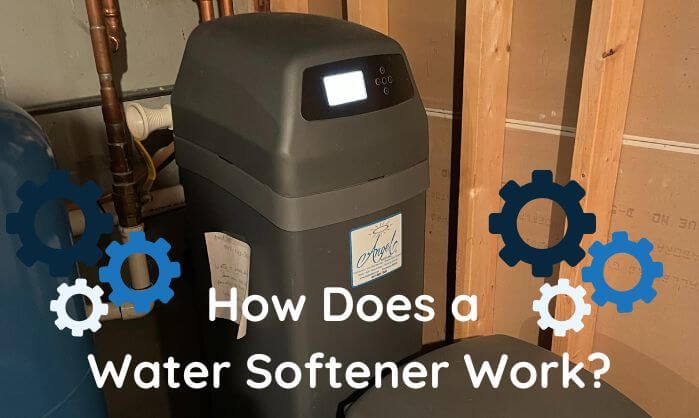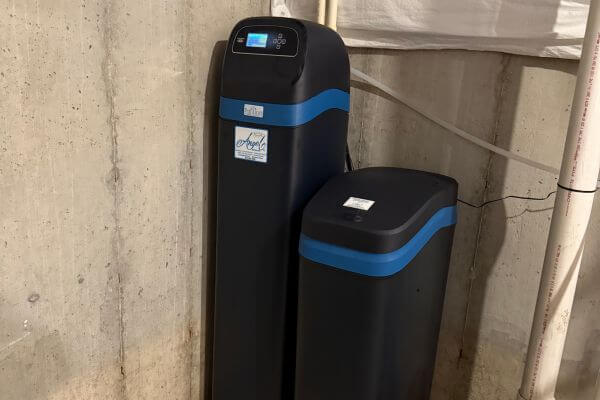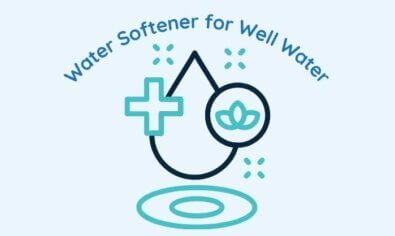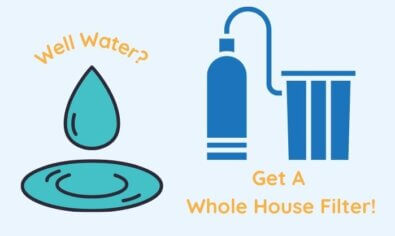How Does a Water Softener System Work?
Many homeowners want to know: how does a water softener system work? This is a common question. Especially if you live in an area with hard water problems. To put it simply, a water softener system takes out minerals that make water hard. Because of this, your family gets clean, pure water every time you turn the tap.
These minerals, like calcium and magnesium, are replaced with sodium or potassium. As a result, this makes your water “softer” and better for use.
So, let’s explore how does a water softener system work in more detail:
- How does a water softener system work?
- What hard water is and why it’s a problem
- The benefits of using a water softener
- Why homeowners in certain areas NEED a water softener
- How to choose the right water softener
- Answers to your water softener questions from our experts
If you’re tired of hard water problems, Angel Water has the solutions you need!

Understanding Hard Water
Before you ask how does a water softener system work, you need to know what hard water is.
Hard water has a lot of dissolved minerals. This happens when water flows through soil and rock.
In addition, hard water can sometimes contain cancer-causing contaminants.
Plus, hard water causes these unpleasant issues:
- Scale buildup: Minerals create scale in pipes, water heaters, and appliances. Therefore, this makes them less efficient.
- Poor soap lather: Soap doesn’t lather well in hard water, so you use more.
- Dry skin and hair: Hard water can leave a residue, drying out your skin and hair.
- Stains: Also, it can stain sinks, toilets, and bathtubs.
- Spotty dishes: Hard water leaves spots on dishes and glasses.
- Bad taste and/ or smell: Furthermore, water softener systems remove material that causes nasty tastes and smells.
Some regions, like Chicagoland and Southeast Florida (near West Palm Beach), have very hard water. This is due to the minerals naturally found in the ground. For that reason, many people in these cities need water softeners. Learning how does a water softener system work is the first step toward solving the problem.
How Does a Water Softener System Work: The Science Behind It
Truly, how does a water softener system work, anyway? The answer lies in a process called ion exchange.
As hard water enters your home, it flows through a special tank filled with resin beads. Manufacturers coat these beads with sodium or potassium ions. Also, the beads are negatively charged.
Next, the resin beads attract and trap the calcium and magnesium ions that cause hardness. In fact, the system also removes other hazards.
The ion exchange process removes unwanted minerals from the water. The resin beads then release sodium or potassium ions into the water. This swap turns hard water into soft water.
Soft water is much gentler on your skin, appliances, and plumbing. Thus, this process helps prevent scale buildup and improves soap lathering.
Subsequently, every time you use water in your home, you enjoy the benefits of a water softener system.
Chiefly, the technology is designed to make your water safer and more comfortable to use. Knowing exactly how a water softener system works makes it easier to appreciate the difference.
How Does a Soft Water System Work with Salt?
Homeowners often ask, “How does a water softener system work with salt?”
The answer is simple: salt is a key part of the system’s regeneration process. Over time, the resin beads in the tank trap so much calcium and magnesium that they need to be cleaned.
To keep working, the water softener system needs flushes out those minerals and recharges the beads with sodium ions.
The salt in the brine tank helps create a strong solution that washes away the hard minerals. In the end, the right salt keeps your water soft and your system running smoothly.
The Regeneration Process: Recharging
During regeneration, the system creates a salty brine solution in a separate tank. Then, the system flushes that brine through the resin tank.
Most importantly, the water softener washes away calcium and magnesium and refreshes the resin beads with sodium ions. After that, the system is ready to soften your water again.
Because of this process, home water softeners need regular salt refills and professional maintenance by a licensed plumber.
Now, more on regeneration:
- Backwash: First, the system reverses water flow to loosen the resin and flush out debris.
- Brining: Next, the water softener draws a salt solution from the brine tank into the resin tank. Sodium or potassium in the solution forces calcium and magnesium off the beads.
- Rinse: Then, the system rinses the tank to remove the salt solution and yucky minerals. Wastewater flows out through a drain.
- Refill: Finally, the water softener refills the brine tank with water to dissolve more salt.
Regeneration takes a few hours. Plus, most systems regenerate overnight.
Types of Water Softeners
There are different types of home water softeners:
- Salt-Based: The most common type. They use salt (sodium chloride) or potassium chloride.
- Salt-Free Water Conditioners: These don’t actually soften your water. They prevent scale formation, but don’t remove minerals.
- Dual-Tank: These models have two resin tanks for continuous soft water.
- Portable: For RVs, apartments, and boats. Specifically, they’re salt-based and need manual regeneration.
Choosing the Right Water Softener System
Once you know how does a water softener system work exactly, it’s time to make a choice. So, how do you pick the best water softener system for your home?
To start, it depends on your water quality. That’s why testing your water is always the first step. Angel Water’s certified plumbers will test for hardness levels and other issues.
Illinois Water Utilities have been reporting some gross contaminants!
Check out the concerning contamination that has been reported by public water utilities in Illinois!

Next, think about your household size. A larger family will use more water each day. Because of this, you may need a bigger unit or a dual-tank system. On the other hand, a single person or small household may only need a smaller, more compact model.
Finally, consider the type of system that fits your needs. Do you have room for a water softener? Or do you need extra filters for iron or chemicals? Also, be sure to compare maintenance needs, cost, and warranty options.

Benefits of a Water Softener System for Your Home and Health
How does a water softener system work to make your life better? Soft water is gentle, clean, and much healthier for your body and household. That’s why so many families invest in water softeners.
To begin with, your plumbing system also benefits. Since soft water doesn’t leave mineral buildup, your pipes stay clear longer. Undoubtedly, you can avoid costly repairs and early replacements.
In addition, your appliances run better and last longer. Think about your dishwasher, washing machine, or hot water heater. These machines often break down faster when they’re exposed to hard water. Luckily, soft water helps protect them.
Not only that, but your skin and hair will feel softer, too. Without all those minerals, showers feel cleaner and more refreshing. Plus, soap and shampoo rinse off more easily.
On top of that, laundry comes out cleaner and brighter. Clothes stay soft, towels stay fluffy, and you won’t need as much detergent.
Because of all these reasons, it’s clear why soft water is better. And now that you understand how a water softener system works, it’s easy to see how helpful it can be.
Why Some Areas Need a Water Softener More Than Others
In many places, hard water is a daily problem. This is especially true in Chicagoland and Southeast Florida.
Both regions have high levels of hard water minerals in the ground. Because of this, homeowners in West Palm Beach and the Windy City face serious hard water trouble.
Even though it’s mostly safe to drink, hard water causes damage over time. Homes in these areas may see more limescale, broken water heaters, and stained sinks. Indeed, people often spend more on cleaning supplies and repairs.
In short, every home is different. That’s why our water experts serve as an essential resource for homeowners in Chicagoland and the West Palm Beach area who want to understand how a water softener system works.
Pro Installation and Maintenance
Installing a water softener might seem easy. However, it’s not a simple plug-and-play job.
If the system isn’t installed correctly, it may not work at all. Even worse, it could cause plumbing issues down the line.
For this reason, it’s always best to hire a licensed plumber. A professional will make sure your system is connected the right way. Additionally, they’ll set the water softener to match your home’s size and water usage.
Although DIY might seem faster or cheaper, it can create bigger problems later. In many cases, people call for help after trying to install it themselves.
Choosing expert help from the start enables you to avoid stress and costly mistakes.
Angel Water Is Here to Help You Soften Smarter
Thankfully, a home water softener can truly solve a host of problems.
Whether you’re in a lakefront condo or a Florida beach house, a soft water system protects your home, your pipes, and your peace of mind. Once you understand how a water softener system works, the need becomes clear.
In essence, your water stays soft, your appliances last longer, and your plumbing stays free from scale.
If you’re searching for answers to the question “how does a water softener system work,” now you know the essential steps that keep your water tasting great.
The experts at Angel Water are ready to support you every step of the way. Our licensed plumbers have years of experience — naturally, we’re here to answer any questions you might have. Reach out to us today!
Interested in a Water Softener System for Your Home?
You don’t have to live with a dry, itchy scalp and brittle hair anymore! It would be our pleasure to help you find the right water softener to make your showers enjoyable again.
Please give us a call at (847) 382-7800 or visit our water softener page to learn more.




